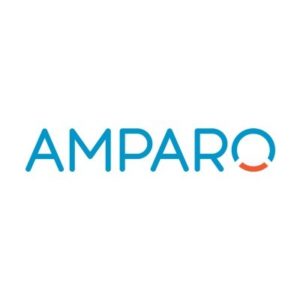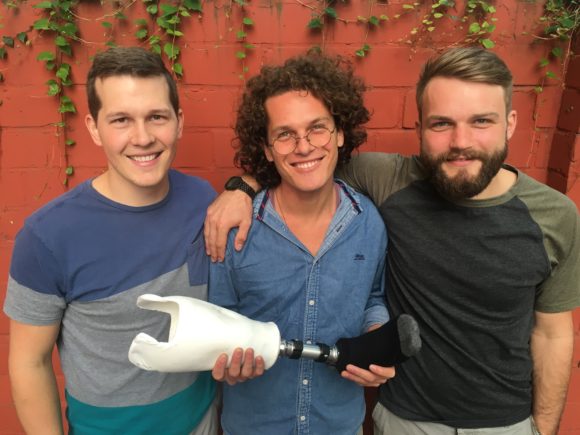Meet our CODE_n CONTEST Finalists 2016: Amparo from Germany

Our CODE_n CONTEST Finalist Amparo focuses on simple but effective solutions for prosthetics in developing nations. Amparo‘s prosthetic socket will allow governmental and non-governmental organizations worldwide to provide services to more amputees and to extend their services with mobile outreach programs. We’ve talked to Co-Founder and Production Engineer Felix Dietrich about his young companies fascinating vision.
What is Amparo all about? How did you come up with the idea?
Felix:AMPARO is about empowering amputees. Amputation is an extremely impactful event in a person’s life, which involves not only overcoming physical challenges but psychological as well. Apart from readapting to a whole different lifestyle, amputees face the social stigma that confront people with handicap in our society, considering them as physically deficient/limited, incapable of performing certain tasks and economically unproductive. We have seen that prosthetic care is key to overcoming these challenges.
Throughout our field research, we realized that high quality products and services are constantly entering the market, however, 80% of the amputees around the world still do not have access to modern prosthetic products and services. In many instances, becoming an amputee can mean entering a poverty cycle.
AMPARO will change this! We aim to empower amputees all over the world to live their lives without limitations. Using human-centered design we are developing an alternative to traditional sockets that is a simpler, faster, more economic. This high-quality technology will help amputees across the world to walk again.

“Digital Disruption“ – that’s the motto of this year’s CODE_n CONTEST. What makes your solution innovative, what makes it disruptive?
Felix: The state-of-the-art method for creating lower limb prostheses require a well-equipped prosthetic workshop. Traditional sockets require intensive work hours from a technician as well as many visits from the patient to the clinic before walking away with a prosthesis. Nevertheless, since the residual limb volume is constantly changing, amputees must replace their sockets every 2 years.
We have identified that the complexities involved in the customization and crafting of the socket are the main obstacles to access. AMPARO changing the game for prosthetic sockets by providing a:
- simpler Fitting Process – AMPARO is directly molded to the amputee’s residual limb. Therefore, the process can be completed in under 2 hours and it requires very few tools; and a
- reusable & Economic Technology – The AMPARO socket can be remolded as many times as necessary, saving money by reshaping the mold instead of paying for new sockets, as well as being environmentally friendly.
You’re one of the 13 finalists in the HealthTech contest cluster. Which challenges do you think young companies have to face in this sector? How do you handle these challenges?
Felix: There are many aspects that make the Health Sector a very complex market.
The most important difference to other markets is the fact that you are dealing with the human life it is a sensitive market that applies to all people. Health is not equal to the absence of diseases, but to the increase of life quality, and this equation becomes more complicated when approached from a monetary perspective. Health is not about money nor business, but involves it all. People don’t want their life to be numbered in terms of a price tag, but to be acknowledged in terms of possibilities. We overcome this challenge by enhancing our humanistic approach to people’s needs and tackle their health problems in a way they don’t feel threatened or jeopardized by the business.
Another factor is that this sector has a very complex stakeholders constellation. They consist of individuals, liberal professionals, clinics, hospitals, insurance companies, etc., which vary not only in complexity, but also in nature – being them public or private entities, as well as national or international ones. We find it essential to understand each of these stakeholders well and learn to walk more freely amongst these players.
Last but not least, it is also important to recognize that this is also an extremely regulated sector. There are necessary requirements that must be fulfilled by acquiring area specific certificates or registering into regulatory institutions – either governmental or international bodies. This constrains on how fast and effective you enter the market.
As we understand it, your dignity socket was particularly created for amputees who currently have no means of getting a prosthetic leg to luck of infrastructure in the area they live in. Do you also work together with aid organizations in order to help with the cost factor?
Felix:AMPARO is creating a technology to enhance the rehabilitation of lower limb amputees who cannot afford to pay for it. This is why we are in close contact with governmental institutions and non-governmental organizations that already provide rehabilitation services.
It makes no sense to give a prosthetic leg to someone that is not prepared to use one. The amputee must be physically fit and psychological inclined to start walking, otherwise this process won’t succeed and the leg will be put aside forever. This is a leg that will never be used, a waist of materials on the one side, and the destruction of hope on the other.
Therefore it’s extremely necessary to collaborate with other actors to make it possible for this technology to reach the final user, not only in terms of costs but also in terms of rehabilitation.
Thanks for talking to us, Felix!






Write a comment